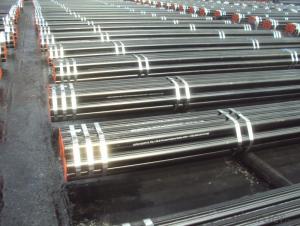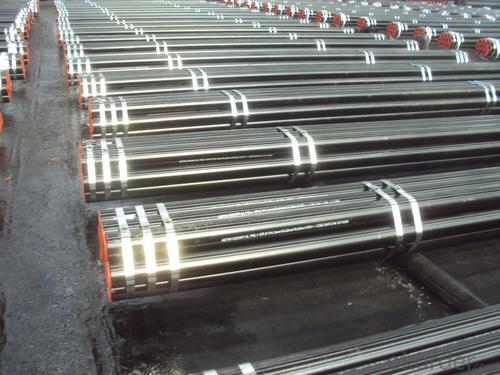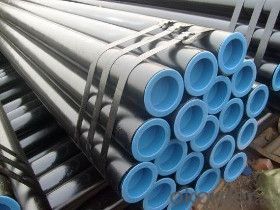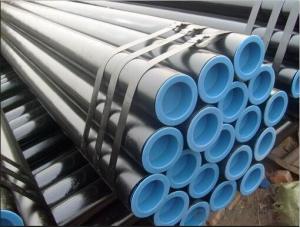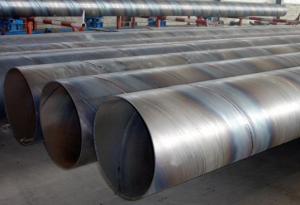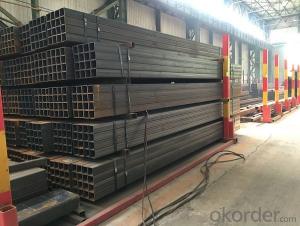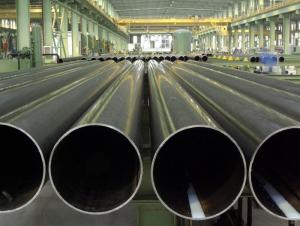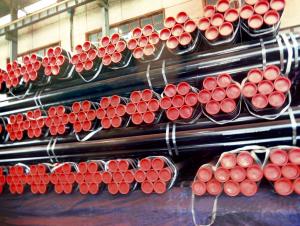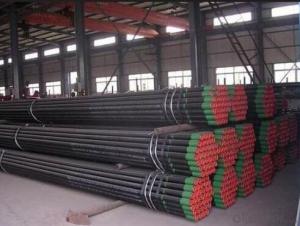Welded Steel Pipe ERW for Oil Tube Good quality Factory
- Loading Port:
- China Main Port
- Payment Terms:
- TT or LC
- Min Order Qty:
- 30 m.t.
- Supply Capability:
- 12000 m.t./month
OKorder Service Pledge
OKorder Financial Service
You Might Also Like
1、Structure of Seamless Pipe ASTM A106/53:
carbon seamless steel pipes are widely used in gas, water and oil, transpotation;constructions;Bridge,highway,windows of model steel door; building materials;fences;heating facilities Fluid Pipe;conduit pipe,scaffolding pipe.etc.
Payment Terms: L/C D/A D/P T/T
.
2、Seamless Pipe ASTM A106/53 Specification:
Standard | GB, DIN, ASTM ASTM A106-2006, ASTM A53-2007 |
Grade | 10#-45#, 16Mn 10#, 20#, 45#, 16Mn |
Thickness | 8 - 33 mm |
Section Shape | Round |
Outer Diameter | 133 - 219 mm |
Place of Origin | Shandong, China (Mainland) |
Secondary Or Not | Non-secondary |
Application | Hydraulic Pipe |
Technique | Cold Drawn |
Certification | API |
Surface Treatment | factory state or painted black |
Special Pipe | API Pipe |
Alloy Or Not | Non-alloy |
Length | 5-12M |
Outer Diameter | 21.3-610mm |
Grade | 20#, 45#, Q345, API J55, API K55, API L80, API N80, API P110, A53B |
Standard | ASME, ASTM |
3、Packaging & Delivery
Packaging Details: | seaworthy package,bundles wrapped with strong steel strip |
Delivery Detail: | 15-30days after received 30%TT |
4、FAQ of Seamless Pipe ASTM A106/53:
1.How is the quality of your products?
Our products are manufactured strictly according to national and internaional standard, and we take a test
on every pipe before delivered out. If you want see our quality certifications and all kinds of testing report, please just ask us for it.
Guaranteed: If products’ quality don’t accord to discription as we give or the promise before you place order, we promise 100% refund.
2.Why should you chose us?
Chose happens because of quality, then price, We can give you both.Additionally, we can also offer professional products inquiry, products knowledge train(for agents), smooth goods delivery, exellent customer solution proposals.Our service formula: good quality+good price+good service=customer’s trust
SGS test is available, customer inspection before shipping is welcome, third party inspection is no problem.
5、Seamless Pipe ASTM A106/53 Images:
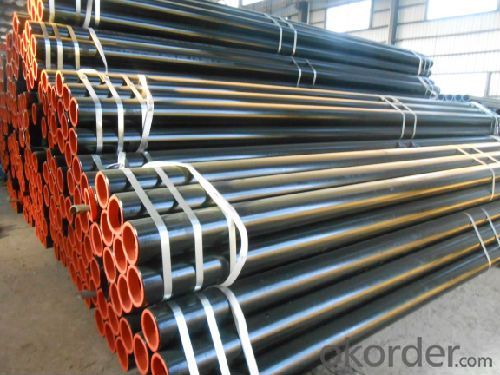
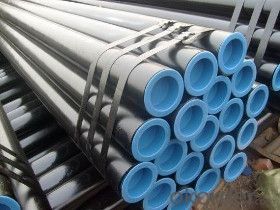
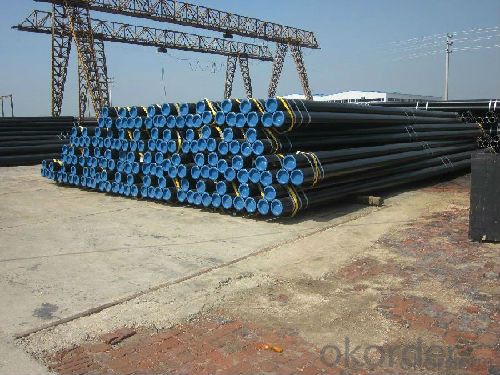
- Q: Can steel pipes be used for underground oil pipelines?
- Indeed, underground oil pipelines can utilize steel pipes. The construction of underground oil pipelines heavily relies on steel pipes owing to their robustness, longevity, and resistance to corrosion. They possess the capability to endure the immense pressure and weight exerted by the oil being transported, along with external forces like soil displacement or seismic events. Moreover, steel pipes can be fortified with coatings or linings such as epoxy or polyethylene, enhancing their resistance to corrosion and extending their lifespan. In conclusion, steel pipes emerge as a dependable and extensively employed option for underground oil pipelines.
- Q: Can steel pipes be used for roller coaster tracks?
- Yes, steel pipes can be used for roller coaster tracks. In fact, they are one of the most common materials used for roller coaster tracks due to their strength, durability, and versatility. Steel pipes provide excellent support and stability for the roller coaster cars, ensuring a safe and thrilling ride experience for passengers. Additionally, steel pipes can be easily shaped and welded to create various track designs, including loops, twists, and turns, making them ideal for creating exhilarating roller coaster layouts. Furthermore, steel pipes are resistant to corrosion and can withstand harsh weather conditions, making them a reliable choice for outdoor roller coasters. Overall, steel pipes are a popular and reliable choice for roller coaster tracks, offering both safety and excitement for riders.
- Q: What are the industries that commonly use steel pipes?
- Some of the industries that commonly use steel pipes include construction, oil and gas, manufacturing, transportation, and infrastructure.
- Q: What are the different types of steel pipes available?
- There are several types of steel pipes available, including seamless pipes, welded pipes, galvanized pipes, and stainless steel pipes.
- Q: How are steel pipes inspected for defects?
- Steel pipes are inspected for defects using various methods, including visual inspection, ultrasonic testing, magnetic particle inspection, dye penetrant testing, and radiographic examination. These techniques help identify any cracks, corrosion, or other defects in the pipes to ensure their structural integrity and prevent any potential hazards or failures.
- Q: How are steel pipes repaired in case of damage or leaks?
- Various methods can be used to repair steel pipes in the event of damage or leaks. Welding is a common approach where a filler material is melted along with the damaged or leaking area, creating a strong bond that seals the leak. This method is effective for small to moderate-sized leaks and finds wide application in industries like oil and gas, plumbing, and construction. Another method involves the use of mechanical couplings. These couplings are designed to connect two sections of pipe securely, ensuring a tight connection. They can be utilized to repair damaged or leaking sections of a steel pipe by removing the damaged area and replacing it with a new section that is linked using the mechanical coupling. This method is particularly useful for larger leaks or damaged sections that cannot be repaired through welding. In certain cases, temporary fixes can be applied using pipe clamps or epoxy compounds. Pipe clamps are employed to seal the damaged area tightly, preventing further leakage. On the other hand, epoxy compounds are directly applied to the damaged or leaking section, creating a temporary seal that stops the leak until a more permanent repair can be carried out. It is essential to consider the severity and location of the damage or leak, as well as the specific requirements of the application, when deciding on the method of repair. In some instances, it may be necessary to replace the entire section of the steel pipe if the damage is extensive or if multiple leaks are present. It is advisable to consult a professional or a specialized pipe repair service to determine the most suitable repair method for a particular situation.
- Q: How are steel pipes used in agriculture?
- Steel pipes are commonly used in agriculture for a variety of purposes, such as irrigation systems, water supply lines, and drainage systems. These pipes are durable, resistant to rust and corrosion, and can withstand high pressure, making them ideal for transporting water and other fluids across farmland. Additionally, steel pipes are used to construct structures like greenhouses, fencing, and livestock enclosures, providing strength and stability to support agricultural operations.
- Q: How are steel pipes used in the renewable energy industry?
- Steel pipes are commonly used in the renewable energy industry for various applications. They are used to transport fluids, such as water or steam, in geothermal power plants. Steel pipes are also used in solar thermal power plants for transferring heat transfer fluids. Additionally, steel pipes are utilized in the construction of wind turbine towers, providing structural support for the turbines. Overall, steel pipes play a vital role in the renewable energy industry by facilitating the efficient and reliable operation of different renewable energy technologies.
- Q: How are steel pipes protected against external moisture?
- Steel pipes are typically protected against external moisture through various methods such as coating them with corrosion-resistant materials like epoxy or zinc, applying protective tapes or wraps, using cathodic protection systems, or utilizing corrosion inhibitors during the manufacturing process. These measures help to prevent the formation of rust and ensure the longevity and reliability of the steel pipes.
- Q: What is the difference between steel pipes and concrete-lined pipes?
- The main difference between steel pipes and concrete-lined pipes lies in their composition and structural properties. Steel pipes are primarily made of steel, which provides strength, durability, and resistance to corrosion. On the other hand, concrete-lined pipes are steel pipes that have been coated with a layer of concrete. This concrete lining adds an extra layer of protection against corrosion and also provides additional structural stability. Concrete-lined pipes are commonly used in applications where protection against corrosion and abrasion is crucial, such as in water distribution systems or sewage pipelines. In contrast, steel pipes are often used in various industries where strength and durability are vital, such as oil and gas pipelines or structural applications.
Send your message to us
Welded Steel Pipe ERW for Oil Tube Good quality Factory
- Loading Port:
- China Main Port
- Payment Terms:
- TT or LC
- Min Order Qty:
- 30 m.t.
- Supply Capability:
- 12000 m.t./month
OKorder Service Pledge
OKorder Financial Service
Similar products
Hot products
Hot Searches
Related keywords
